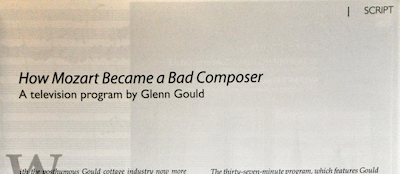
A few years ago I came across a press release about a TV program by Glenn Gould, with the provocative title How Mozart Became a Bad Composer. I attempted to get a copy of it from the Glenn Gould Foundation, but was told that it was being prepared as part of a DVD set (which was supposed to be released last year). After exchanging a few emails, I ended up ordering an issue of the Glenn Gould magazine where the full transcript of the program was published. The following paragraph from that transcript comes to my mind every now and then, and I decided to post it here and maybe return to it sometime. If nothing else, it is pretty good food for thought on creative work.
Perhaps it all comes down to this: within every creative person there’s an inventor at odds with a museum curator. And most of the extraordinary and moving things that happen in art are the result of a momentary gain by one at the expense of the other. In Mozart’s case, the inventor was endowed with the most precocious gifts, and the curator, who manufactured all those sequences and arpeggiated links and passages of scale padding, zealously carried out his duties as well. But what I object to is that Mozart tries to cover up the conflict between them. Time and again, the curator wins out over the inventor, as he has every right to do. But I’d like to find some evidence of protest, some frantic, disruptive, unsyntactical attempt on the part of the inventor to get free of the curator’s control. Or, in the absence of that desperation move, I’d like Mozart to feel guilty, and because of that guilt to sacrifice something of the charm and courtesy which mask the humanity of his work.
What did Gould’s Mozart playing sound like? Here is one example.
Wikipedia says,
The A minor sonata is the first of only two Mozart piano sonatas to have been composed in a minor key . . . It was written in one of the most tragic times of his life: his mother had just died, and his father blamed him for his wife’s death. Mozart was devastated, and poured his constant torment into his sonata, one of the darkest. The last movement in particular has an obsessive, haunted quality about it, heightened near the end by the interruption of the relentless drive to the conclusion by repeated and chilling quiet falling passages.
